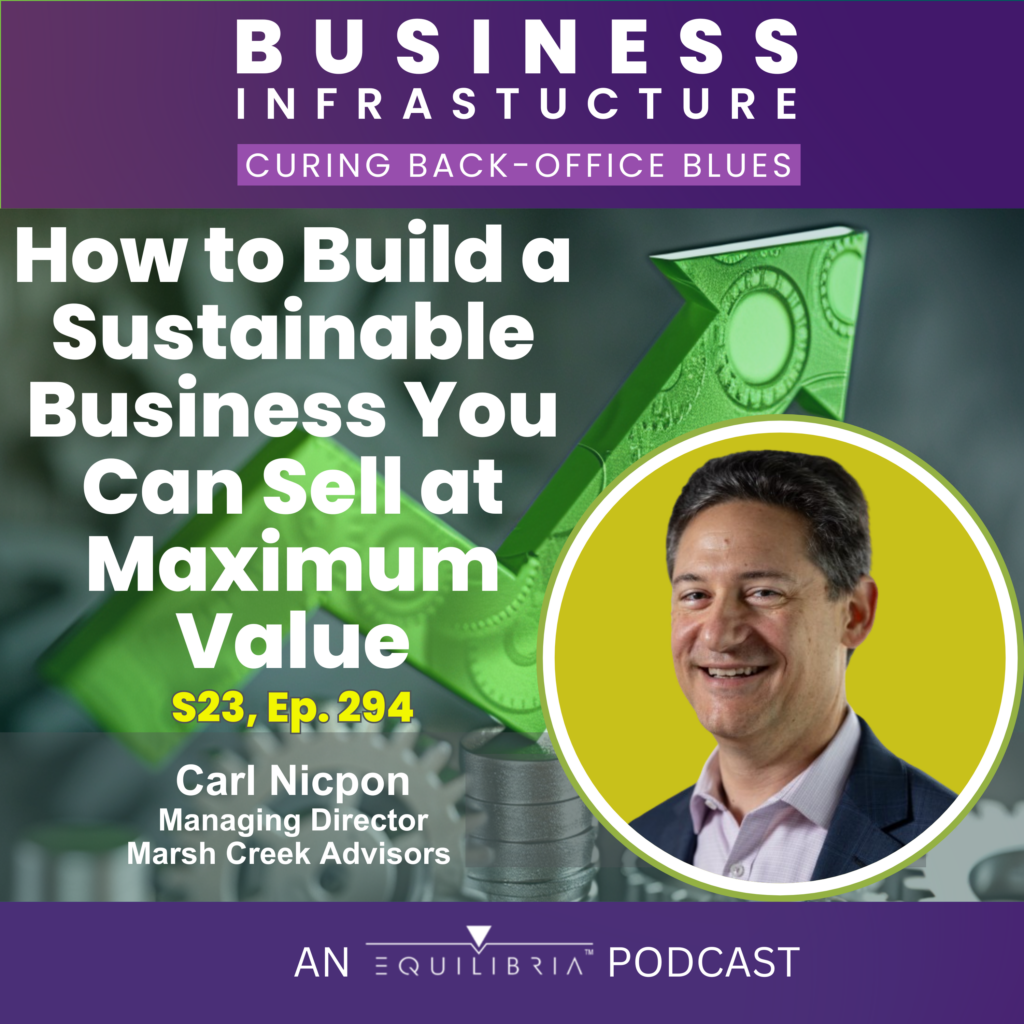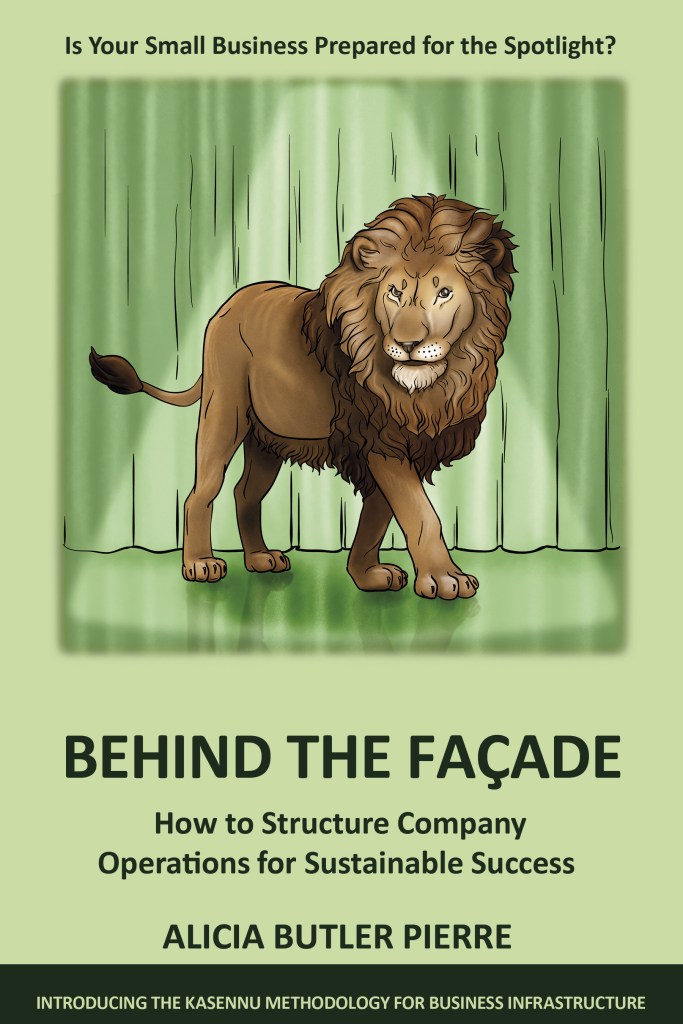Transcript
This is Season 23 of the Business Infrastructure Podcast – the show where we share operational tips, tactics, and strategies to help you cure any back-office blues you might be experiencing.

Welcome back! I’m Alicia Butler Pierre and I’m so excited about this journey we’ve been on together during this growth strategies masterclass. In case you missed it, so far in the masterclass, we’ve had guests share their expertise on the following:
- Vetting and validating growth ideas,
- Creating a strategic growth plan that includes validated ideas,
- Developing project plans to implement your company’s growth strategy, and
- Growing your business through strategic partnerships.
Another way to strategically grow your business is through mergers and acquisitions. In fact, your growth strategy could include exiting or selling your business altogether. Have you thought about that? Well, you may find its something worth exploring. That is, if you’re willing to put in the work.
This is Ep. 294: Carl Nicpon Explains How to Build a Sustainable Business You Can Sell at Maximum Value
Carl Nicpon. It is such an honor to speak with you. I feel like I’m in the presence of a celebrity because of a business you used to own that I’m very familiar with here in the Atlanta, GA area. But we’ll get more into that in a little bit. How are you?
I’m great, Alicia. It’s great to be with you.
Let’s get right into it because there’s so much ground for us to cover. And I know we won’t be able to cover everything, but I know you’ll give us a really good crash course in mergers and acquisitions as well as tips for selling a business. But first, I’m always curious about how people land in the positions they’re currently in. You’re a Managing Director at Marsh Creek, which is a business advisory and mergers and acquisitions firm based in Atlanta, GA.
This is a specialized field that I know Carl you don’t necessarily go to university to major in. But what’s interesting is that when I reviewed your profile on LinkedIn, I learned that your degrees are in psychology and theology. I’m sure there’s an interesting story here – so, how did you transition from that to helping people exit their businesses?

Oh, that is a winding, winding road. I’ll give you the really quick version. I actually worked in schools. I was a school counselor, social worker and administrator, for quite a while until I just wasn’t finding that fulfilling. And after getting some advice, like I really was a businessman at heart, I finally gave myself over to being part of our family business and it just kind of kept drawing me back in. I couldn’t avoid it any longer, so I was honestly very honored to get to work with my mother, my uncle and my cousin and worked in that business for years.
Eventually bought the business from our parents. So, I was third generation and then sold that business, right before the pandemic. So, absolute grace, especially because it was in the wedding prom apparel space and that industry just collapsed. So, I all along had been teaching in the MBA programs at the University of Georgia. And between my adjunct teaching and my being a business owner and having the exit, I just had a number of people say to me, “Carl, you really ought to be helping people accomplish what you accomplished. And you’re someone who naturally wants to help other people learn and do things really well. And you’ve got the personal experience. You’ve been on that ride before. You understand it like nobody else.”
I was like, Okay, I’m going where I’m called. So that’s how I landed up in M&A. And gratefully so, because it’s a joy to help people accomplish that momentous moment. I say that entrepreneurs go into business really to achieve freedom. You get freedom of time, freedom to do it, your money and freedom, who you’re going to work with and who you’re going to work for and what you’re going to work on.
Then, you recognize that there’s also a lot of responsibility that comes with that. I think then they exit their business for Freedom 2.0. When you don’t have to worry about payroll, you don’t have to worry about client deliverables, whatever the case may be. And then at that point, truly, it’s a whole new life. And helping people transition to that is quite an honor.
Freedom 2.0. I love that! That actually describes what I’m actively working towards. I’ve hustled and grinded for a long time, I’ve paid my dues, now it’s time to truly work smarter and not harder. And, for the record, I recognize that the skills it took to get my business to this point are not the skills needed to get it to the high seven figure mark.
Now Carl, the work you do fascinates me because as business owners we can be on both sides of the business brokerage transaction. In other words, we can strategically grow our businesses by acquiring other businesses similar to ours or we can sell our business. Can we start with the acquisition side of the transaction? What is a merger and acquisition, or M&A, as its usually referenced?
Merger is the bringing together of two companies that either do the same thing or do things that have synergy when brought together. Taking those operations and bringing them under one roof. And sometimes it has the connotation that it’s equal, but that’s not always the case. There oftentimes is a merger where one party is sort of the controlling party.
Acquisition, though, really is the acquiring of one company into another. So, we might be splitting hairs a little bit. And the vast majority of exits that we’re going to be talking about here are truly acquisitions, where one entity acquires another, brings them into their operation, assimilates them into their operation, absorbs their customers, their employees, their work processes, and then brings them together to have a very cohesive end product.
Thanks for that explanation, Carl. Can we now talk about the other side of what I’m calling the business brokerage transaction? The selling side. At what point should entrepreneurs seriously start to consider selling or preparing to sell their businesses?

It’s a great question. And there is definitely something to begin with, the end in mind. Many entrepreneurs, myself included at times, think, Look, I just got to get something going right? If you think about what’s valuable, right, to people at the other end,then it helps you build it in a certain way. I think the analogy of home ownership often is a good analogy. Here’s what I mean by that. If you’re going to redecorate inside and you have very unique style, and you go and you just bring color all over the place and you mishmash different materials, and to you that is attractive.
That’s great and you might live in the most wonderful home that you can imagine. When you go to sell that home, your real estate agent is likely going to say, “We probably need to do some work on this before we bring it to market. And that work is going to take energy, time and money.” If you would have thought about what the market would really love when you did your original decorating, then you could both have enjoyed something that was really great while you were living in it and have built towards a final result, the sale of your home. That really got top dollar for the property.
So, you could certainly build a business along the way that just works for you and your lifestyle and there’s nothing wrong with that. But if you’re also thinking with the end in mind of, I’m eventually going to sell this, what’s attractive to a buyer? then you might build it a little bit differently as you go. So I think it’s useful to start thinking from the very beginning. Now, I also know that that sometimes seems a little impractical. I get it because there’s so much coming at you as a business owner, but when you’re starting to seriously think about, Hmm, how am I gonna transition this? Because I’m not going to do this forever.
Then the moment you start to have that thought, it’s probably a good idea to engage an advisor to help you start thinking about what’s the value of my business. I’ll tell you that I, in owning my business, didn’t always know what my business was worth. And it’s a lot harder to make strategic decisions when you don’t know the current value of your business and you don’t know how an important decision might affect that. So I always think that even if exit is not on your top of your mind, that being able to know where your value is at and keep up with that is a good idea.
Sounds like a good metric for us to add to our dashboard of things we track to measure success. Hmm…I wonder if this is something we could add to the X-matrix we covered earlier in this growth strategies masterclass. Speaking of measuring success, at your firm, Marsh Creek, you all have a valuation tool literally designed to help entrepreneurs figure out the current value of their business. Can you tell us more about, Carl?

So, we do produce and provide the opportunity for a business owner to have a valuation. And I think that’s a particularly powerful tool. I don’t specifically advise people in those last few years of business ownership around the things that they need to do to improve their business. The reason that we don’t do that at Marsh Creek is number one, I feel that if you need a supply chain expert, then let’s get you someone with those skills. And if you have a culture issue in your business and, we got to maybe improve the people side of things and let’s get someone who’s really fantastic in that area.
If financials are something we need to address, then let’s get a chief financial officer to come in and fractionally help you there. My point is that I don’t think you want a jack-of-all-trades trying to coach you through all these different things. Experts there are worth their money because they produce results faster. And we don’t try to do that. We just try to connect you with the right people to make that happen and then we’ll take you to the exit process, when it’s time.
Knowing the value of business, knowing what areas of your business could stand to improve and increase the valuation, and then working with outside experts to see what you can’t see and bring their skills to bear on implementing a process to quickly make improvements will absolutely make a difference.
So it sounds like the business valuation tool that you all have is like a diagnostic. And I appreciate that home ownership analogy. With all the home improvement shows that are on TV, I think its an example that many people can identify with, even if they’ve never bought or sold a home.
And, you know, Alicia, there’s another side to it, too. I remember the last house that my wife and I had, our family. We were getting ready to sell it. And about a year before we went to sell it, we did some big work on it. And it definitely impacted the sale price that we got for the house. But I remember doing all that work and then seeing it accomplished and turning to my wife, it was like, Wow, I wish we’d have done this a while ago, because a house that’s beautiful to sell is also beautiful to live in. The same thing is true with a business.
A business that is attractive to sell is also a business that’s fun to run. And that’s a business that, when you invest in it like that, then you could keep running it and be happy, or you could sell it and be really happy. Either way, you got choice. If you’re building it that way all along, you’re in great position. And going back to what you said in the very beginning, Alicia, about business owners and entrepreneurs in particular, the skillset that it takes to bring a business from literally nothing, to create something incredible out of nothing and create that first million in revenue, that skill set is different than the skill set it takes to get it from seven to eight figures. And I think one of the things that’s important to do as an entrepreneur is look and see, Am I the kind of person that is going to enjoy that new set of challenges?
One of the major challenges is bringing structure to that, because now you’ve got to replicate it. And it’s okay to say, “I recognize that my core skill set is creating something out of nothing. My core skillset is not bringing structure to this entity and taking it from being a child to a teenager.” And so, I really encourage people to do some soul searching, because at the end of the day, you’ve got to be fed in this process. You’ve got to enjoy it. It’s got to bring you life. It’s a lot of work, so you might as well enjoy the ride.

I agree with everything you just said 100%. It’s all about introspection and it reminds me of two things. One has to do with something you said to me when we first met. You said that, “Entrepreneurs solve problems that the world hasn’t necessarily tackled before, and they don’t always want structure imposed on them.” That really stuck with me because that’s exactly the problem we solve here through this podcast – giving entrepreneurs the tools to build the very infrastructure that they don’t necessarily want to do, but know they have to do if they want to scale responsibly and sustainably.
The second thing I’m reminded of is the story of the guy who created PowerPoint. Are you familiar with that story?
I’m not. I’m excited to hear it.
I’m going to paraphrase here, but here’s the gist. His name is Robert Gaskins and I saw him on a documentary on Netflix called, “Something Ventured.” He mentioned what inspired him and his business partner to create PowerPoint and how quickly the software took off. He said something critical…he said that he reached a point where their business was so successful and that he knew it could reach even higher heights, but he recognized he didn’t have the skills required to lead the company there.
So, when Microsoft approached him, he sold PowerPoint and the rest is history. It’s a testament to what you were saying Carl being honest with yourself. Introspection is critical to determining which side of that business brokerage transaction you want to be on, if you want to be on any side at all.
Yeah, Alicia. And you know what’s really cool is that there’s actually a sort of third option. Because we talk about this in terms of, Hey, you could either keep running it on your own or with your existing team, or you could sell it, let somebody else do that. Right? Like in the case of PowerPoint. But there’s actually a middle of the ground. And I think this one often gets looked over. And here’s what I mean.
You could have a very successful company that you see massive growth potential in, and you know that you don’t have all the skills to do that, but you’re also not ready to walk away from this idea. Now, you could keep pouring it on and grunting it out yourself, and that’s one option. You could turn it off to somebody else, turn it over to somebody else to just take it over. But what if you had a partner who could come in, help bring some of the structures that help companies succeed in scaling, bring capital to the table to enable growth, and also, at the same time, allow you to take some of the money the value that’s tied up in your business and put it in
you a different vehicle for investment to start to diversify your wealth?
80% to 90% of business owners’ wealth is tied up in their business. If you talk to any investment advisor, that’s not the best investment strategy, right? Better investment strategies are diversification. So, think about that. Also think about your business as part of your wealth portfolio. And when you put all that together, imagine what it would be like to take some of those chips off the table. You still get to work on this project that you love, but now you do it in a way where other people are helping you fund it, other people are helping you bring structure to it, expertise to it, and they also take some of the risk away.
Maybe you’re no longer the only one worrying about payroll at the end of the night, those kinds of things. I think the strategy of rolling some equity into an acquisition like that is great. And financial results wise, it’s not uncommon to see an owner who does that take and put in. I’m just going to use some made up numbers that mean nothing. But say they sell their, and they put $5 million in the bank in the first go. And then two to three years later, when the firm that acquired that business and the owner rolled some equity, and meaning they left some of their ownership into the new entity alongside that acquiring partner, kept working alongside.
Two to three years later, that acquiring partner sells the business, and now they sell it for $30 million and a portion of that. So the exit they have the second time is actually bigger than the first. That’s what we call “rolling equity” or a “second bite at the apple.” And I think that that strategy is super delicious and one that we should talk about more often.
I’m glad you brought that up, Carl because I have a friend who did that exact thing. He brought in a business partner who made a significant investment in the business and their growth exploded! They grew from about 4 to 20 full-time employees in less than a year.

I’d like to shift gears and delve deeper into how the selling process works, but from a business infrastructure perspective. For those listening for the first time, business infrastructure is a system for linking people, processes, and tools and technologies to ensure growth happens in a profitable, repeatable, and sustainable way.
Carl, you already mentioned the people element of business infrastructure. In other words, the people that could potentially get involved in the selling process. You’re an M&A advisor, but there’s also business brokers. Can you explain what these roles mean?
Business brokers tend to handle smaller transactions. M&A advisors tend to handle lower middle market transactions. We specialize in five to $50 million transactions all day long. And then there’s investment bankers, and those tend to handle more complex and much larger transactions. But essentially, we all do some of the same thing, which is helping position a company for sale, marketing that business, identifying a set of multiple buyers. That’s a key, key aspect of the process, because I oftentimes hear somebody say, “Well, I’ve already identified a buyer for my business.” One buyer doesn’t give you any choice, and choice is what helps us drive up the price. But all those different roles do somewhat of the same function at different levels.
And you said earlier that your job as an M&A Advisor is to help entrepreneurs figure out how to increase the value of their business. That can include identifying the subject matter experts that may be required to build or repair certain parts of their businesses, right?
Precisely. As a business owner, you don’t have to know everybody, you just have to know someone that you trust. And that person, typically like the M&A advisor, is going to kind of quarterback things and help you identify who needs to be on your team, given your particular business and your industry. And you don’t have to have this all figured out. You might also have some people that you already have trusted relationships with. And a good advisor is going to work together with people that you already trust.
They may, however, also say those folks are great and there are some additional needs that are more specialized that we’d like to bring to the table. And we’re going to make some recommendations about how to fill that out. As an example of that, you might have a
relationship with a lawyer. That’s great. That lawyer might have helped you form your entity, might help you written some contracts. But when it comes to M&A, it’s a very specific subset of the law and you want people who practice that area. And in the same way that you wouldn’t go to a podiatrist for open heart surgery.
You want to make sure that the specialist in law has good understanding of the area of your need. A different area might be you might have some intellectual property that’s really worth protecting and valuing. And so you want someone who can help make sure that that’s shored up, and that would be someone who is a specialist in patent and trademark. So, we’re going to help you identify the areas of business that bring value and increase the valuation. And then we’re going to help you identify people that can help you maximize that and protect it along the way.
At a minimum, we probably need an M&A advisor or broker. We probably need a lawyer to memorialize and help along with the negotiation. And we also probably need a CPA or a tax advisor because there’s going to be a tax impact on this transaction. And there might be a need to justify some of the way that the revenue and expenses have been recorded and someone who understands all that is critical.
One other one that I think is an important part of the team is your financial advisor. And this is another good example of where you might need a new person on the team. Some financial advisors have been helping you all along, and you haven’t had a lot of liquidity to manage. So your accounts are relatively small.
And I think I know where you’re going with this Carl…the people who start out with you may not have the skills to continue on the journey with you. There’s nothing wrong with that, but everybody needs to realize that and accept it. It sounds like you need to “trade up.”

Now, let’s tackle the process element of business infrastructure. At Marsh Creek, you all have cleverly given your proprietary process a name – it’s called the Power Exit StrategyTM process. Can you describe how it works?
It starts with a valuation. And one of the key things about a valuation is helping make sure that the business owner and the advisor team is on the same page about what a great outcome looks like. I think it’s commonly said that business owners, very much like parents, think that their own children are the most wonderful human beings and most beautiful in the world. We have a little bit of bias.
Business owners have that same bias. And so it is important to be realistic about that. The market doesn’t always see your business the way you do. And at the end of the day, your business is really worth what someone else is willing to pay you for it. And our job is to help you understand what that is by getting a really good valuation from the market. Then the next part is a decision to be made. And that decision is, Am I satisfied with that end result? If we go forward with this process, am I going to be happy with that? Because if not, then I need to do some work on the business.
We’re likely going to help you identify a few areas to go to work. And one of the largest pieces that makes a business not ready to transition and one of the first places that we advise owners to go to work, is owner dependency. At the end of the day, people don’t want to buy you doing a job or buy them doing that job. People want to buy a system that doesn’t require them to go in and roll their sleeves up and do that work on a daily basis. So owner dependency, literally firing yourself from every role to the point where you can take three or four week vacation and the business doesn’t lose a beat.
That’s a great litmus test. And that’s about building good people around you to make that happen. And interestingly, when you empower people around you, they’re going to help you make your business better and they’re going to take stress out of your life. So that’s benefits of firing yourself from each of the roles that you start out, because you start as the CEO, the “Chief Everything Officer”, and you want to move towards being the Chief Executive Officer. And those are two very different things.
A couple of other things that we really want to look at, and an important one is customer concentration. It is very easy to build a business with a particular customer that loves you and keeps throwing business your way, that’s great. But you always have to be prospecting and adding new customers. If you have any one customer that is, represents more than 20% of your total revenue annually, that is an area that you’re going to want to take a look at. It doesn’t mean that you can’t exit the business.
It just means that your choices upon exit are going to be fewer and are going to involve what we call more structure. More structure meaning it’s going to maybe include some greater earnouts or a seller note, those kinds of things. So that’s some things that we look at when we imagine how can the business be a little bit more attractive and ready for transition.
I feel like there’s more you have to say about this, Carl. Please, don’t hold back!
When we think about then a business owner who says, “Okay, yeah, let’s go for it!” One of the keys in the Power ExitTM strategy and the Power ExitTM process is making a market. And what we mean by that is bringing an environment where a number of potential acquirers get visibility into the opportunity of being your partner. When we have multiple people bidding on your business, that drives the price up. It also gives you a Plan B. And that’s critical because this is a stat across the country, 50% of deals will fall apart after an LOI is signed.
Having a Plan B is critical. Number one, to be able to go to it. Number two, to be able to say with a straight, honest face to the person that you’re currently negotiating with, we have no problem walking away. And when you call their bluff, it gives you more negotiating power. So that’s part of it. And we say that part of this strategy is we’re going to create the environment for you to sell your business.

Nobody knows your business better than you do. And so when we create the environment, you’re the one who’s going to shine. And we’re going to whisper in the background and help you know when to time information release and for and with whom. The other piece that I keep about the power exit strategy here is that when you think about selling a business, it’s another full-time job. It’s a lot of work. Out of every hundred people who expressed interest in buying a business, only one ever will. Those are crazy odds!
Wow!
What that also means is that if you go to sell your business and you’re not getting someone to help run that process with you, then you have a 99% burn rate on your time of talking to people that won’t go anywhere. And they sound great, but they are honestly just kicking tires. One of our jobs to keep powerful momentum moving forward is to make sure that we’re only dealing with vetted, good, real buyers, and we know how to separate the wheat from the chaff. And that keeps your time protected so that you can focus on running your business, keeping it going, because the last thing you want to do is take your eye off the ball and have the last six months
show a downturn in the financials. And now the buyer says, “Well, it’s a little bit more risky now. We’re going to lower the price.”
Hmm…and I’m sure that happens often. Carl, you mentioned an LOI. What is that?
Right, so…a couple of terms that we probably should break down for people, and I’m glad we’re doing this at the end. So there’s an IOI. Not every deal will have an IOI, but IOI is an Indication of Interest, and that may lead to an LOI, a Letter of Intent. A Letter of Intent is not binding, but it specifies, here are the high-level terms of the deal. And the more that we can get included in that LOI negotiation, the better.
Even defining things like how we’re going to talk about what working capital is, you don’t need to know what working capital is, you just need to know that at this stage, it’s important that your advisor is thinking about these things so that you don’t come to the end of the process and find out all of a sudden that the seller, the buyer, is expecting you to have a whole bunch more money and cash left in the business to operate it. So good negotiation at the LOI stage is critical. A couple other terms I think is really important for people to know about. How do we value a business? It’s actually a pretty simple formula. It’s EBITDA adjusted. And I’ll tell you how we do that.
EBITDA is Earnings Before Interest, Taxes, Depreciation, and Amortization. Basically, how much is your business really making in cash flow? We adjust it to add in the things that a business owner runs through the business that wouldn’t be needed to run the business going forward. So, when you took a trip and you charge it to the business, because you talked about a few things on the trip that were business related. We’re not going to judge, but you actually get credit for that. So we want to know about those things because it will increase your adjusted EBITDA.
Then the other half of the equation is the multiple. And the multiple is pretty simply what have other businesses in your industry traded for as a multiple of their own EBITDA? That multiple we apply and then we get a valuation, and you’re always going to produce a range. It’s not a science, it is an art. And the multiple goes up as you have a more attractive business, one that runs on its own, one that has revenue that is contracted or subscription. So those are the kinds of things that increase the valuation, not just on the profitability side, but also on this multiple or how many times the business the EBITDA is worth.

We could have an entire conversation just on the vernacular of your world. For example, private equity – I wish we had more time to talk about that in this episode but we don’t. We might have to do a part two. But for now, where can we learn more about preparing our businesses for sale?
Honestly, here’s my answer to this question, Alicia, and as much as I am a big fan of research and reading, there are books like Built to Sell, The E-Myth Revisited, that are great listens and reads. But I think the biggest thing I’d say is talk to an advisor. Why? There’s a lot of nuances, and you might as well not spend your time trying to learn it all yourself and let someone bring their expertise to your business. You’re going to get far more out of a 1-hour conversation to get things started than you are out of the hours that it takes you to read any book. Now, there’s nothing wrong with educating yourself, but go to seminars, engage in some live events, and talk to an advisor, because I think it’s a great use of your time and you want to start developing those relationships early anyway.
Duly noted! Do you have any parting words of advice for us, Carl?
I guess the last thing I’d leave our listeners with, Alicia, is that as an entrepreneur, if you boil it down, I think the fundamental skill set that unites all entrepreneurs is that entrepreneurs are gifted at figuring something out that hasn’t been figured out before or doing it in a way that hasn’t been done before. And they do that over time, over a series of I tried this, and this is the result it produced. And whether they’re doing it consciously or not, they are iterating bit by bit by bit and trying new things.
Whether they’re actually scientifically A/B testing or not, they’re learning as they go, and they’re making it better and better and better. And as a result, entrepreneurs think to themselves, I really can do anything, because you know what? You have! The one thing that’s different about this moment when we talk about exiting your business is that you get one shot. You don’t get the key that allows you to have been successful up until now, so far, which is the opportunity to iterate. One shot deal. Get it right. Get it right by creating a team around you who have already done it a number of times and aren’t cutting their teeth on this particular transaction.
And on that note, wow! What a powerful way to end this interview. Carl, thank you so much!
My pleasure, Alicia. It’s great to be with you.
I don’t know about you, but I’m blown away by the information that Carl shared. I can’t thank him enough for agreeing to participate in this growth strategies masterclass. I also want to thank you for hanging in there with us along this journey.
If you’re interested in learning the value of your business and how you can increase it, whether you want to acquire other companies or sell your own, then be sure to reach out to Carl and sign up for their Power Exit StrategyTM service. We’ll have links to this information as well as Carl’s contact information at BusinessInfrastructure.TV. Again, that’s BusinessInfrastructure.TV.
If you enjoyed this episode, then please subscribe, give us a five-star rating, and leave us a review.

Join me in the next episode where I’ll share some financial metrics that we here at Equilibria are starting to track so that we can confidently begin working with Carl and Marsh Creek. Be sure to come back to the place wherever you’re listening so you don’t miss this next episode!
Until then, remember to stay focused and be encouraged. This entrepreneurial journey is a marathon and not a sprint. This podcast episode was written and produced by me, Alicia Butler Pierre. Audio editing by Olanrewaju Adeyemo. Original score and sound design by Sabor! Music Enterprises. Video editing by Gladiola Films. A special thank you to our sponsor, Equilibria, Inc., and to Grant Revilla for creating the show notes.
This is the Business Infrastructure – Curing Back-Office Blues podcast.



















